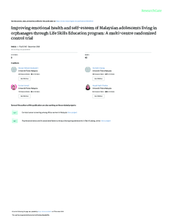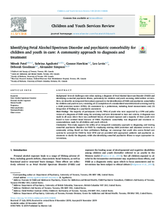Displaying 101 - 110 of 525
The following evaluation looks at a dialectical behavioural therapy (DBT) skills group implemented with young females in a Scottish residential service.
This article focuses on the lived experiences of orphaned learners and their perspectives relating to the support offered by the School-Based Support Team (SBST) within schools, in two education districts of the Free State province, South Africa.
This toolkit is designed for the social service workforce in need of basic counseling skills. It includes mini lessons that teach fundamental counseling skills and activities and worksheets to provide opportunity to practice the skills.
This chapter from 'Addressing Multicultural Needs in School Guidance and Counseling' focuses on the psychological and social issues that orphans and other vulnerable children experience when their parents are no longer alive.
The current randomized control study aimed to determine, if a life skills-based intervention could improve the emotional health and self-esteem among Malaysian adolescents in orphanages.
This article describes an integrated three-phase approach to the identification of Fetal Alcohol Spectrum Disorder (FASD) and psychiatric comorbidity for children and youth in care, consisting of: (1) completion of a standardized neurobehavioral screening tool by a child protection worker (CPW); (2) assessment by a pediatrician, including facial measurements and; (3) integration of findings in a psychiatric assessment.
This module outlines 3 hours (180 minutes) of training activities and materials related to psychosocial support (PSS) and social and emotional learning (SEL) in emergency contexts.
The aim of this study is to examine mental ill-health amongst children known to social services based on care exposure including those who remain at home, those placed in foster care, kinship care or institutional care and the general population not known to social services.
This study finds that the size of the nuclear family has a significant positive relationship with refugees’ mental health, whereas family separation has a significant negative relationship.



